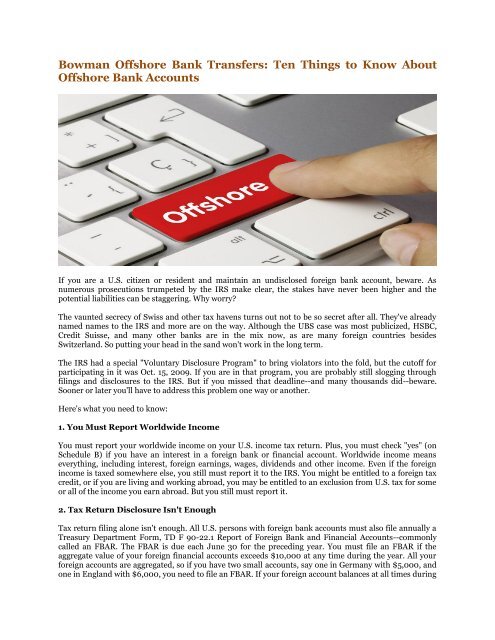Bowman Offshore Bank Transfers: Ten Things to Know About Offshore Bank Accounts
Create successful ePaper yourself
Turn your PDF publications into a flip-book with our unique Google optimized e-Paper software.
<strong>Bowman</strong> <strong>Offshore</strong> <strong>Bank</strong> <strong>Transfers</strong>: <strong>Ten</strong> <strong>Things</strong> <strong>to</strong> <strong>Know</strong> <strong>About</strong><br />
<strong>Offshore</strong> <strong>Bank</strong> <strong>Accounts</strong><br />
If you are a U.S. citizen or resident and maintain an undisclosed foreign bank account, beware. As<br />
numerous prosecutions trumpeted by the IRS make clear, the stakes have never been higher and the<br />
potential liabilities can be staggering. Why worry?<br />
The vaunted secrecy of Swiss and other tax havens turns out not <strong>to</strong> be so secret after all. They've already<br />
named names <strong>to</strong> the IRS and more are on the way. Although the UBS case was most publicized, HSBC,<br />
Credit Suisse, and many other banks are in the mix now, as are many foreign countries besides<br />
Switzerland. So putting your head in the sand won't work in the long term.<br />
The IRS had a special "Voluntary Disclosure Program" <strong>to</strong> bring viola<strong>to</strong>rs in<strong>to</strong> the fold, but the cu<strong>to</strong>ff for<br />
participating in it was Oct. 15, 2009. If you are in that program, you are probably still slogging through<br />
filings and disclosures <strong>to</strong> the IRS. But if you missed that deadline--and many thousands did--beware.<br />
Sooner or later you'll have <strong>to</strong> address this problem one way or another.<br />
Here's what you need <strong>to</strong> know:<br />
1. You Must Report Worldwide Income<br />
You must report your worldwide income on your U.S. income tax return. Plus, you must check "yes" (on<br />
Schedule B) if you have an interest in a foreign bank or financial account. Worldwide income means<br />
everything, including interest, foreign earnings, wages, dividends and other income. Even if the foreign<br />
income is taxed somewhere else, you still must report it <strong>to</strong> the IRS. You might be entitled <strong>to</strong> a foreign tax<br />
credit, or if you are living and working abroad, you may be entitled <strong>to</strong> an exclusion from U.S. tax for some<br />
or all of the income you earn abroad. But you still must report it.<br />
2. Tax Return Disclosure Isn't Enough<br />
Tax return filing alone isn't enough. All U.S. persons with foreign bank accounts must also file annually a<br />
Treasury Department Form, TD F 90-22.1 Report of Foreign <strong>Bank</strong> and Financial <strong>Accounts</strong>--commonly<br />
called an FBAR. The FBAR is due each June 30 for the preceding year. You must file an FBAR if the<br />
aggregate value of your foreign financial accounts exceeds $10,000 at any time during the year. All your<br />
foreign accounts are aggregated, so if you have two small accounts, say one in Germany with $5,000, and<br />
one in England with $6,000, you need <strong>to</strong> file an FBAR. If your foreign account balances at all times during
the year <strong>to</strong>tal less than the equivalent of $10,000 U.S., you do not need <strong>to</strong> check the box on your tax<br />
return or file an FBAR, but you must still report any account earnings on your tax return.<br />
3. There Are Big Tax Penalties<br />
If you don't comply with one or both sets of obligations the penalties are severe. You sign tax returns<br />
under penalties of perjury, so if you fail <strong>to</strong> report your worldwide income--or even fail <strong>to</strong> check the box<br />
disclosing you have a foreign account--it can be considered tax evasion and fraud. The statute of<br />
limitations on such criminal acts is six years. Plus, the statute of limitations never expires on civil tax<br />
fraud, so the IRS can pursue you 10 or 20 years later for back taxes, interest and penalties. If you failed <strong>to</strong><br />
report income, your civil liability <strong>to</strong> the IRS can include a 20% accuracy-related penalty or a 75% civil<br />
fraud penalty.<br />
4. FBAR Penalties Are Even Bigger<br />
The penalties for failure <strong>to</strong> file an FBAR are even worse. Failing <strong>to</strong> file an FBAR can carry a civil penalty of<br />
$10,000 for each non-willful violation. But if your violation is found <strong>to</strong> be willful, the penalty is the<br />
greater of $100,000 or 50 percent of the amount in the account for each violation--and each year you<br />
didn't file is a separate violation.<br />
5. You Can Go To Jail<br />
Filing a false tax return is a felony, while failing <strong>to</strong> file is only a misdemeanor--think of it as the Wesley<br />
Snipes rule. A person convicted of tax evasion can face a prison term of up <strong>to</strong> five years and a fine of up <strong>to</strong><br />
$250,000. Filing a false return can mean up <strong>to</strong> three years in prison and a fine of up <strong>to</strong> $250,000. A<br />
person who fails <strong>to</strong> file a tax return can face up <strong>to</strong> one year of prison and a fine of up <strong>to</strong> $100,000. Failing<br />
<strong>to</strong> file FBARs can be criminal <strong>to</strong>o, and the penalties are even more severe. The monetary penalties can be<br />
up <strong>to</strong> $500,000 and the potential prison term is up <strong>to</strong> ten years.<br />
6. Voluntary Disclosure Is Still an Option<br />
If you admit your failures <strong>to</strong> the IRS and say you want <strong>to</strong> make it right, you've made a "voluntary<br />
disclosure." Don't confuse this with the "Voluntary Disclosure Program," which had an Oct. 15, 2009<br />
deadline. It is <strong>to</strong>o late for that prepackaged program, but it's not <strong>to</strong>o late <strong>to</strong> make an individual "voluntary<br />
disclosure." A voluntary disclosure must be truthful, timely and complete. You must: cooperate with the<br />
IRS in determining your correct tax liability; and make good faith arrangements with the IRS <strong>to</strong> pay the<br />
tax, interest and penalties determined by the IRS.<br />
While a voluntary disclosure does not guarantee immunity from prosecution, the government generally<br />
will not prosecute you if you come forward voluntarily before you're under investigation. (If the IRS is<br />
already investigating you, all bets are off.) Note, however, that in publicizing the IRS Voluntary Disclosure<br />
Program in 2009, the IRS made clear it would show no mercy <strong>to</strong> those with undisclosed offshore accounts<br />
who didn't turn themselves in by the Oct. 15, 2009 deadline. For that reason, some tax lawyers fear that<br />
the traditional advantage of a voluntary disclosure--no criminal prosecution--is less certain.<br />
Stepping forward should be done through a tax lawyer <strong>to</strong> the IRS Criminal Investigation Division. Usually<br />
the case will be referred <strong>to</strong> the civil branch of the IRS where all the filings, amending and penalty<br />
calculations are done. You then must file amended income tax returns for past years and delinquent<br />
FBARs. There's no bright line for how far back you'll have <strong>to</strong> go, as situations vary. However, the Oct. 15,<br />
2009 program required six years of amended tax returns and FBARs, so that's a good benchmark. The<br />
<strong>to</strong>tal cost of making a voluntary disclosure is also hard <strong>to</strong> assess, but it can be more than the amount in<br />
your foreign account.<br />
7. "Quiet Disclosure" Is Also an Option<br />
Some practitioners consider a voluntary disclosure "noisy," since it involves going <strong>to</strong> the IRS Criminal<br />
Investigation Division. A "quiet" disclosure involves a correction of past problems without drawing
attention <strong>to</strong> what you are doing and without going <strong>to</strong> the IRS Criminal Investigation Division. If you<br />
amend all past tax returns <strong>to</strong> report all income, check the box on Schedule B, and file all past due FBARs,<br />
haven't you (quietly) fixed everything? Arguably, yes. You would send in all the money you owe or wait <strong>to</strong><br />
be billed. If you have been paying foreign taxes on your foreign earnings, your foreign tax credits could<br />
even net out the U.S. tax, so you might not owe back taxes.<br />
If you reported and paid tax on all your income but did not file FBARs, you should attach a statement<br />
explaining why they were late. Perhaps you had never heard of FBARs or were <strong>to</strong>ld by your accountant<br />
you were in full compliance. You can avoid penalties if you had "reasonable cause" for not filing FBARs,<br />
but the grounds for waiving penalties aren't terribly clear.<br />
8. Inconsistency Will Hurt You<br />
Can you amend your tax returns, reporting your worldwide income and checking the foreign account box,<br />
but not bother filing delinquent FBARs? By checking the tax return box acknowledging your foreign<br />
account, you are admitting you have an FBAR filing obligation. So not also filing the delinquent FBARs<br />
seems risky.<br />
Even though FBAR penalties are big, there have been some indications the IRS may not be pushing them<br />
<strong>to</strong>o hard. If you don't file a pile of old FBARs, perhaps it won't be obvious you didn't file in the past? A tax<br />
lawyer cannot recommend this, but some clients are probably choosing not <strong>to</strong> file old FBARs.<br />
9. Prospective Compliance Only Is Risky<br />
Can you start filing complete tax returns and FBARs prospectively, but not try <strong>to</strong> fix the past? Some<br />
people think the IRS is so overwhelmed with FBARs and tax returns that you might be OK, but the risks<br />
are enormous and I cannot recommend it. The IRS may ask about the lack of prior FBARs and of prior tax<br />
returns disclosing a foreign account. If they ask questions, you should respond through your at<strong>to</strong>rney and<br />
you can't lie.<br />
10. Keeping Money <strong>Offshore</strong> Is Still Legal<br />
Should you close all your foreign accounts and bring your money home? You are entitled <strong>to</strong> have money<br />
and investments anywhere in the world as long as you disclose your foreign accounts. If you are<br />
considering not trying <strong>to</strong> clean up your past tax returns and FBARs, you may be tempted <strong>to</strong> close your<br />
foreign account. However, closing your foreign account doesn't relieve you of the obligation <strong>to</strong> file<br />
accurate tax returns and FBARs. Tying off the problem prospectively may make sense, but can make your<br />
lack of compliance even worse if your actions are viewed as efforts <strong>to</strong> conceal your previous offshore<br />
activities. For that reason, don't take any of these steps without professional advice.<br />
There's widespread confusion and noncompliance involving foreign bank accounts and the situation is<br />
unlikely <strong>to</strong> get better. Get some professional advice and try <strong>to</strong> get your situation resolved.



